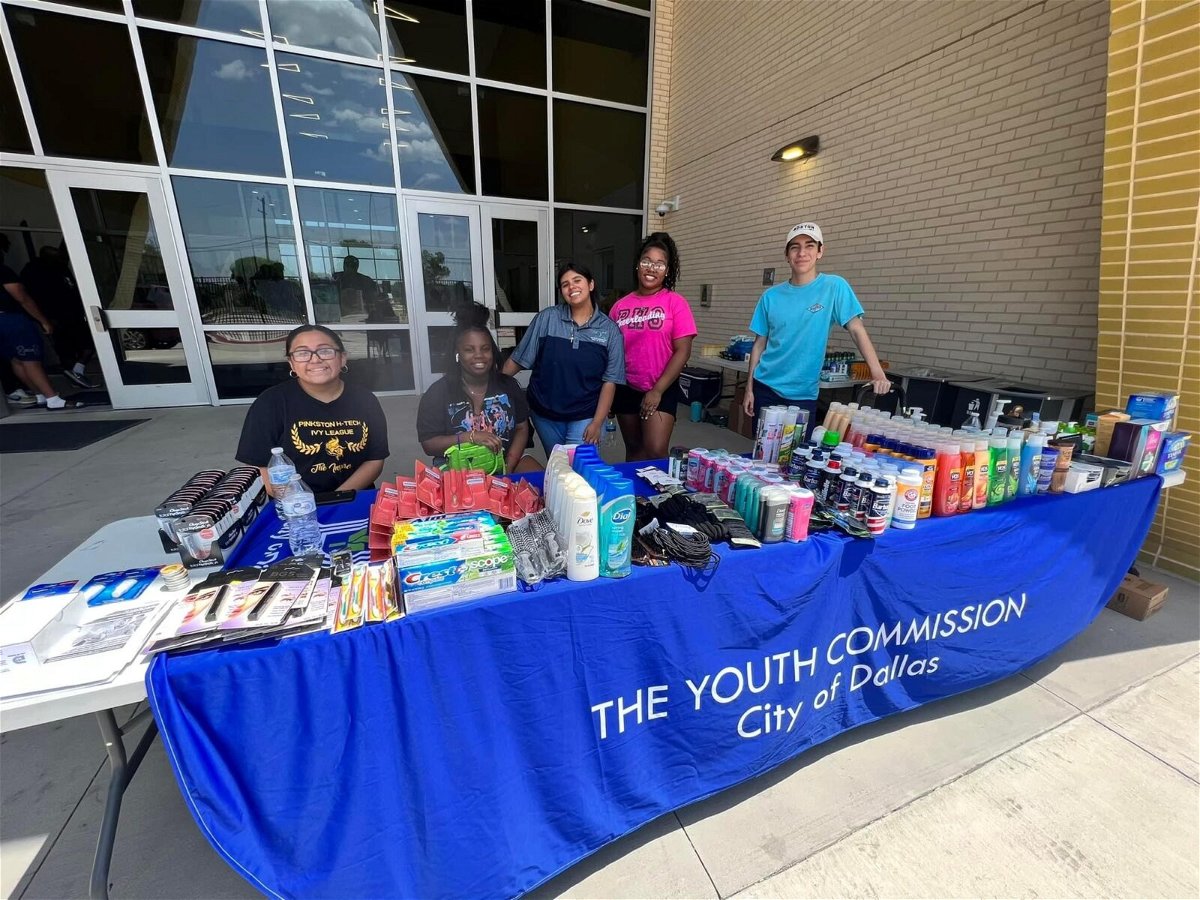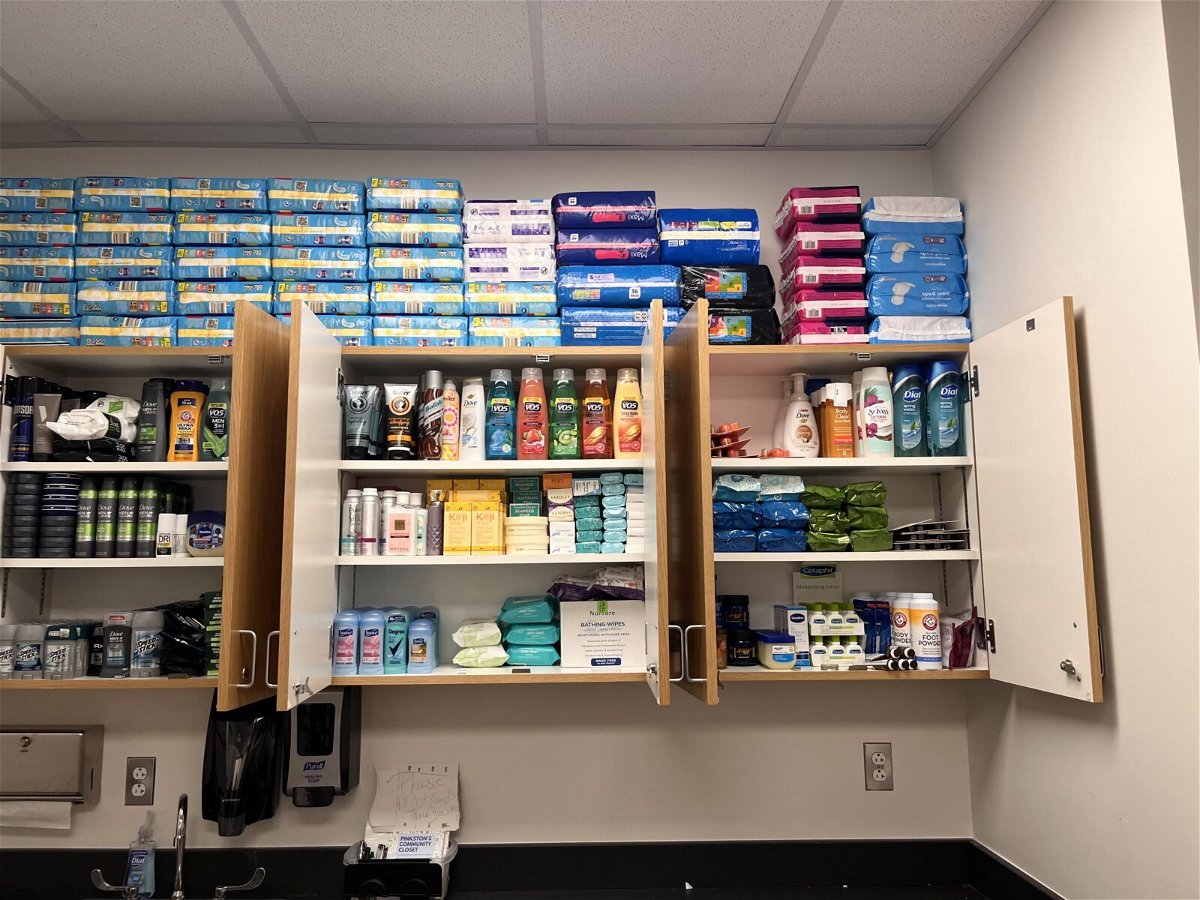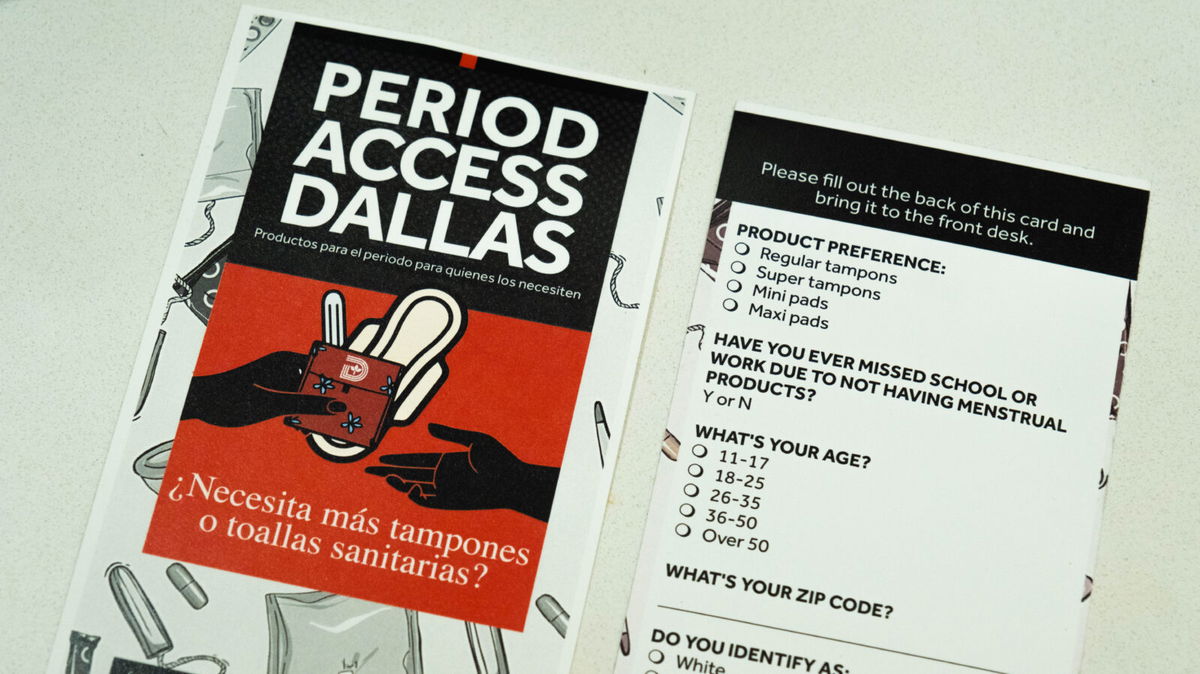For many women across West Dallas, their time of the month is predictable, but access to a pad or tampon is not.
“I had a personal experience when I started my cycle while at school, and I didn’t have anything with me, so I went to the nurse’s office and they gave me the smallest liner,” Dr. L.G. Pinkston High School senior Margarita Hernandez says. “When I went home, my mom and I thought of the idea of creating a little box [with free feminine hygiene products], but the idea turned into a whole closet.”
As a District 6 Youth Commissioner, Hernandez meets monthly with other City of Dallas students to address and advocate for issues in their communities. She presented her idea to the committee supervisor, who gave her the green light.
Hernandez created flyers and organized donation drives, which led to the creation of a community closet at the high school last November. Students simply fill out a card with their grade level and items requested.

“It is actually perfect,” Hernandez says. “I went into the closet two days ago and it is fully stocked, and I see kids having cards filled out.”
Prior to this student-led initiative, Hernandez says there were no feminine hygiene products available at Pinkston. Though the community closet is now stocked, students have to be made aware of it because of its location tucked behind the administration offices, which students can’t access easily.
“There are no products in the bathrooms; they don’t fill up the pad and tampon dispensers,” Hernandez says, pointing out that she launched the initiative in response to this critical need.

Hernandez didn’t need to launch a campaign to find feminine hygiene products. After Dallas ISD Skyline High School students campaigned in spring 2021, the district pledged to install pad and tampon dispensers in all high school and middle school restrooms by fall 2021, and stock them over the next five years. They budgeted $100,000 annually.
We reached out to Dallas ISD’s communication department to learn why the dispensers in Pinkston’s restrooms have been empty since the new high school campus opened in January 2022.
According to David Bates, Dallas ISD’s chief operations officer, pads and tampons are stocked as often as other restroom essentials, such as toilet paper and paper towels. He says feminine hygiene products should be available in restrooms in all high schools and 70% of all middle schools. The district is currently looking into whether or not to stock elementary school bathrooms.
“We were able to get the dispensers for free because we were buying the products in bulk, so there would be no reason that we wouldn’t put the products in a dispenser in the restroom,” Bates says. “Where we don’t have the dispensers, we do have the products in the clinic with the nurse.”
Bates is unsure why the products are not in the Pinkston bathrooms. He says if the space was newly renovated, it may not be on his radar. He plans to check into the matter.
A spokesperson for the district says at other schools, once feminine hygiene products were added, they tended to go quickly. District officials assume students wanted to stock up on these products.
“At first, there was a little bit of abuse of the product, because it’s new and it’s free and it’s there, so we were going through quite a bit,” Bates says.
Schools aren’t the only place where access to feminine hygiene products is a problem. That’s why the City of Dallas rolled out a pilot Period Access Dallas (PAD) program which supplies free sanitary pads and tampons at more than 70 libraries, recreation centers and community centers.
The program’s goal is to address women’s inability to purchase menstrual products, also known as, “period poverty,” which affects as many as two in five people in the United States. Research shows that lack of access to menstrual products can cause women to miss work, school or similar commitments. In addition, the reuse of products can be harmful to their bodies.
The problem is both a matter of gender equity and public health, says Dr. Theresa Patton, a gynecologist at Kessler Women’s Healthcare.
“You are more at risk for infection or irritation if you can’t change your pad frequently or don’t want to because you don’t have access to enough supply,” Patton says. “We also worry about toxic shock syndrome, which is not as much of a problem anymore, if you leave your tampon in for too long which can lead to infections that are fairly significant.”
The city’s PAD pilot program began last May with $200,000 in federal dollars from American Rescue Plan funds. According to a City of Dallas survey evaluating the pilot program, 43 percent of responders indicated having missed work or school due to the lack of menstrual products.

Residents can obtain a month’s supply of products by filling out a card at any designated distribution location, which asks a few questions relating to demographic information. The individual hands it over to a City of Dallas employee at the front desk of a library or rec center. This way, the individual does not necessarily have to verbally ask for the product, and the items are given to them in a plastic bag.
Statistics reported in October 2022 showed that nearly a third of these card requests were coming from zip codes 75212 and 75211, “likely due to [the] West Dallas Multipurpose Center,” a neighborhood hub for social services.
“Our sites in West Dallas, since the beginning, have had the highest rates of distribution,” says Jessica Galleshaw, director of the city’s office of community care.
City libraries, rec centers and community centers had distributed 2,500 products in October 2022, 3,400 by December and now has given out more than 8,000 pads and tampons. In addition to the monthly supply bags, women can find free products in these city building restrooms.
Initial federal funds have been spent and currently, the project relies on the Racial Equity Fund in the city’s general budget. However, Councilmember Paula Blackmon, who is an advocate for this program, is looking to partner with nonprofits, companies and donors to ensure the program continues.
“I would think that women would be more comfortable going into work and school, which also helps with self-esteem and self-worth,” Blackmon says.
Work also is happening at the state and federal levels to make feminine products more affordable. Last month, Texas became the latest state to eliminate sales taxes on menstrual products, also known as the “pink tax.”
However, Galleshaw says there is still space for legislative action to ensure women are able to afford and access essential menstrual products.
“In the long run, the financial impact of having to purchase these products on a monthly basis is obviously going to be felt more significantly on those who are lower income to start with,” Galleshaw says. “I hope that someday, programs like SNAP or WICK or assistant programs will be able to support this critical, non-negotiable need, which is as necessary as food.”
Additional reporting by Dr. L.G. Pinkston High School graduate Kaitlyn Torres as part of her participation in Dallas Free Press’ Journalism Pathway Program.

Leave a Reply